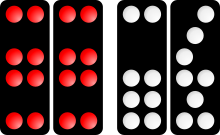Pai Gow Meaning
- This is because most Pai Gow Poker games are designed to be played by just one player (you) against the house, with the house always taking the role of the banker. While this does mean that you won’t be able to take advantage of the edge you get as the banker, it also means that you won’t have to worry about risking your bankroll by having to pay out your fellow players.
- Nov 04, 2015 Pai Gow Poker is a variation of the Chinese domino game pai gow. The game is known for a slow rate of play and lots of pushes, resulting in low risk game. While a game of skill, most hands are obvious how to play, and it is not difficult to learn proper strategy for the rest of them.
- Pai Gow poker is played with a standard English deck of 52 cards plus the joker, or bug. The joker can only be used as an ace or a card that completes a straight or flush. Players and the dealer receive seven cards they place into two hands: five cards and two cards. The five-card hand must be of a higher total rank than the two-card hand.
“Ace High bonus” shall mean a wager which pays if the dealer’s seven cards are an Ace High pai gow (“pai gow” as defined in N.J.A.C. 13:69F-11.1); 2. “Fortune bonus” shall mean a wager which considers the best hand possible among the player’s seven cards and is reconciled against a Division approved posted paytable.
One of the most important parts of a live Pai Gow Poker games is taking the time to be the banker when your turn comes around. You can choose to skip this option, but if you can afford it, you probably should take advantage; the banker definitely has some advantages that the regular player doesn’t.
Pai Gao Games

It’s worth pointing out that in online Pai Gow Poker, you’ll probably never be able to be the banker. This is because most Pai Gow Poker games are designed to be played by just one player (you) against the house, with the house always taking the role of the banker. While this does mean that you won’t be able to take advantage of the edge you get as the banker, it also means that you won’t have to worry about risking your bankroll by having to pay out your fellow players.
Why You Want to Be the Banker in Pai Gow Poker
If you play in a live Pai Gow Poker game, you’ll find yourself given the opportunity to bank every few hands or so, depending on exactly how the game is structured. Some casinos rotate the chance to bank around the table, while others have the casino bank every other hand in between the player opportunities to bank. In order to bank, you must have enough money on the table to pay off all potential winning bets; if you have less money than this, some casinos will also let you “co-bank,” sharing the responsibility with the casino.
You should never, ever pass up an opportunity to be the banker when the option is available. Even in a one-on-one game against the casino, there will only be the slightest of house edges for the casino on hands when you bank. Depending on the exact “house way” method used by both sides, the house edge on these hands is only about 0.2%; in a one-on-one game, this would drop the total house edge from 2.73% (the house edge when you are the player) to an average combined house edge of about 1.46%.
But the news gets even better when you’re playing against your fellow players and decide to bank. You can actually have a significant advantage as the banker, especially when there are many players at the table. At a full table, you’ll hold about a 0.2% edge over the house, assuming all players are using the correct house way strategy. When you take into account the fact that some of the other players will likely make mistakes – some of them significant – your advantage will likely be even bigger.
Pai Gow Meaning Math
Much of this advantage comes from the fact that the 5% commission you pay on winnings is handled differently when you are the banker. As a normal player, if you play five hands and win three times while losing twice, you’ll pay that 5% commission on a total of three winning bets. As the banker, you only pay the commission on your net winnings at the end of the hand; so if you win three hands, but lose two, you’ll only come out ahead by one bet – and only pay commission on that one bet.



